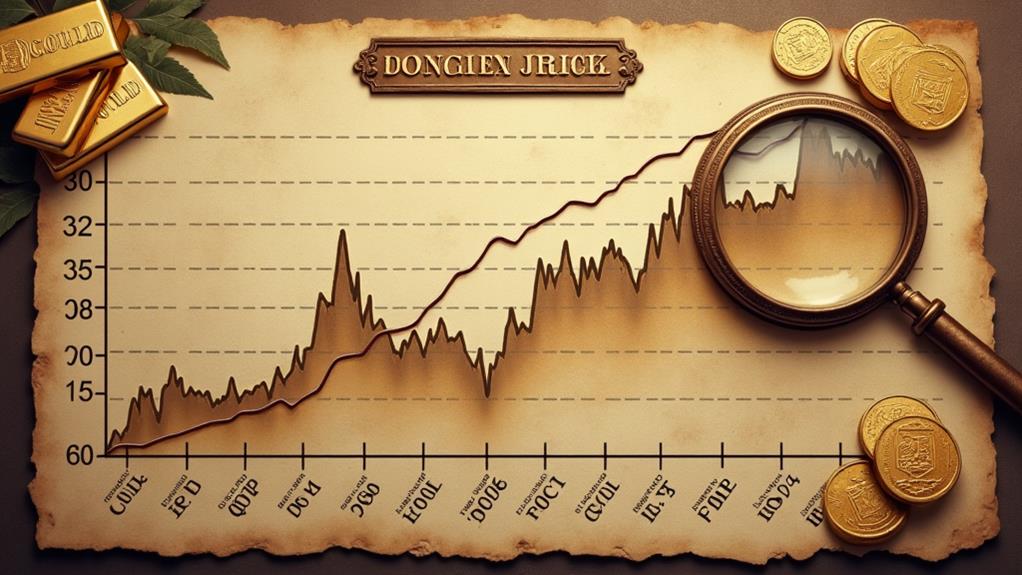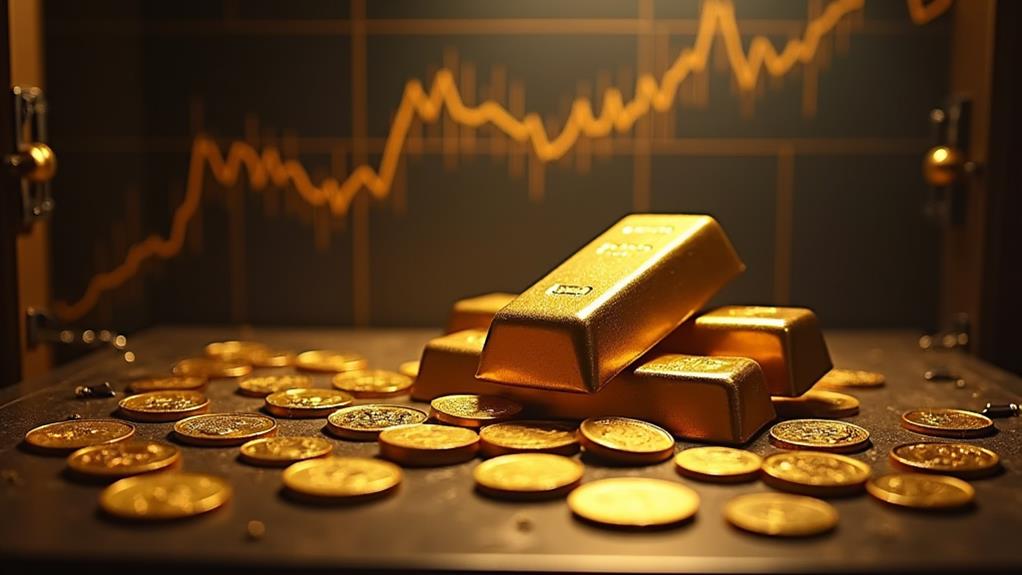A Practical Guide: Should You Invest in Gold in 2024?
As we approach 2024, the question of whether to invest in gold becomes increasingly pertinent amid fluctuating global economic indicators and rising geopolitical tensions. Gold's historical reputation as a safe haven asset, particularly during periods of economic uncertainty and inflation, is well-documented. Nevertheless, the decision to invest in gold should not be taken lightly, given the associated challenges such as storage costs and market volatility. To maneuver through these intricacies and make an informed decision, it is crucial to weigh the pros and cons, understand the economic landscape, and consider the timing of your investment.
Key Insights
- Gold serves as a hedge against inflation and economic uncertainty, protecting purchasing power.
- Historically, gold prices rise during global economic downturns and geopolitical instability.
- Gold offers portfolio diversification, showing low correlation with traditional asset classes.
- Physical gold requires secure storage and incurs costs, while Gold ETFs provide liquidity and flexibility.
- Monitoring economic indicators, inflation, and political stability is crucial for timing gold investments in 2024.
Historical Performance of Gold

Throughout history, gold has been a symbol of wealth and a stable store of value. Understanding the historical performance of gold provides insight into why it remains a preferred asset in investment portfolios.
Gold prices have exhibited resilience, especially during periods of economic uncertainty and inflation. Historical gold market trends show that demand often increases when central banks diversify reserves or when the US dollar strength fluctuates.
For example, during economic downturns, investors flock to gold as a safe haven. Monitoring these trends helps investors make informed decisions.
As a hedge against inflation and currency devaluation, gold's historical performance underscores its role in diversifying and stabilizing investment portfolios, even amid volatile market conditions.
Economic Indicators for 2024
Predicting the economic landscape for 2024 involves a careful analysis of vital economic indicators. Significant global economic indicators, such as GDP growth rates and inflation, will impact gold prices.
The Federal Reserve's stance on interest rates is particularly influential; higher rates typically decrease gold demand, as bonds and savings accounts become more attractive. On the other hand, lower interest rates can drive up gold prices.
Price volatility is another factor to consider, often influenced by global economic uncertainties. For those developing gold investment strategies, understanding these indicators is fundamental.
The economic outlook for 2024 suggests potential shifts in monetary policy and global markets, making it imperative to stay informed. Monitoring these indicators can assist in making sound investment decisions.
Gold Vs. Other Investments

As investors evaluate the economic indicators for 2024, it becomes important to compare gold with other investment options. Gold offers several avenues for diversification:
- Gold ETFs: These provide a way to invest in gold without owning physical gold.
- Gold Mining Stocks: Investing in companies that extract gold can offer leveraged exposure to gold price movements.
- Physical Gold: Owning tangible gold, such as coins or bars, ensures direct investment.
- Gold Futures: These contracts allow investors to speculate on future gold prices.
- Stock Market: Traditional equities present a different risk-reward profile compared to gold.
Each option has unique risks and rewards, requiring a tailored investment strategy.
With gold price movements often inversely related to the stock market, understanding these dynamics is essential for informed decision-making.
Pros of Investing in Gold
Investing in gold offers several advantages, particularly as a hedge against inflation, which preserves purchasing power during economic downturns.
Furthermore, gold contributes to portfolio diversification, reducing overall investment risk through its low correlation with other asset classes.
In addition, its status as a tangible asset provides a sense of security and stability, especially in times of financial uncertainty.
Hedge Against Inflation
Why do many investors turn to gold during times of economic uncertainty? Gold has long been seen as a reliable hedge against inflation. When inflation rises, the price of gold often follows suit, making it a valuable investment.
Here are some reasons why gold is favored:
- Gold bars and gold coins: Tangible assets that retain value.
- Gold reserves: Central banks hold substantial amounts, providing stability.
- Gold market trends: Historically responsive to inflationary pressures.
- Price of gold: Typically increases during economic downturns.
- Diversified investment: Offers protection against currency devaluation.
Gold investment, consequently, can offer a safeguard against the eroding value of money, ensuring that investors' portfolios remain strong even in volatile economic climates.
Portfolio Diversification Benefits
Beyond its role as a hedge against inflation, gold similarly plays a vital part in portfolio diversification.
Should you invest in gold 2024, you will find that gold bullion, gold mining companies, and gold jewelry offer significant portfolio diversification benefits.
Precious metals like gold have historically shown low correlation with traditional asset classes such as stocks and bonds. This characteristic makes them an excellent long-term investment, reducing overall portfolio risk.
By choosing to buy gold, investors can spread risk and potentially improve returns. Diversifying with gold, whether through physical bullion or investments in gold mining companies, can stabilize a portfolio, especially during market volatility.
Hence, reflecting on gold in 2024 could be a wise move for diversified portfolios.
Tangible Asset Security
Gold's enduring appeal lies in its status as a tangible asset, providing a sense of security that is often absent in more abstract investments. Owning physical gold, such as a gold bar or gold coins, offers investors a reliable store of value.
Gold preserves wealth over time, making it a wise choice for those looking to safeguard their assets against economic uncertainties.
- Physical security: Unlike digital assets, physical gold cannot be hacked or erased.
- Intrinsic value: Gold has essential worth, independent of market fluctuations.
- Long-term stability: Historically, gold prices have shown resilience against inflation.
- Universal acceptance: Gold is globally recognized and easily traded.
- Diversification: Including gold in an investment portfolio reduces overall risk.
Investing in 2024, consider buying gold bars to secure your financial future.
Cons of Investing in Gold

Investing in gold, while often praised for its stability and historical value, comes with several notable drawbacks that potential investors should carefully consider.
First, gold does not generate income like dividends or interest, which can make it less appealing compared to other assets. Moreover, when you hold gold, you incur storage and insurance costs.
Liquidity can also be a concern; selling physical gold can be time-consuming and may come with significant transaction fees. Gold mutual funds offer more liquidity but are subject to management fees.
In addition, gold prices hit volatility levels that can lead to uncertain returns. For those seeking investment advice, it is vital to weigh these cons before deciding if gold is a good investment for your portfolio.
Market Predictions for Gold
Market predictions for gold in 2024 hinge on several important factors, including global economic trends, inflation rates, and political stability.
Analysts suggest that economic uncertainties and inflationary pressures could drive gold prices higher, as investors seek safe-haven assets.
Furthermore, geopolitical events and political stability will play a vital role in shaping market dynamics and investor confidence in gold.
Global Economic Trends
As we progress into 2024, understanding global economic trends becomes crucial for predicting the performance of gold in the market. These trends influence gold supply, gold prices, and the viability of gold as an investment.
Significant factors to watch include:
- Global economic stability: Uncertainty can drive demand for gold.
- Interest rates: Lower rates often make gold more attractive.
- Government policies: Changes in regulations can impact gold bonds and gold exchange-traded funds.
- Geopolitical tensions: These can raise gold prices as investors seek safe havens.
- Long-term investment strategies: Evaluating the time to invest in gold involves reflecting on its role in a diversified portfolio.
Monitoring these trends will assist in crafting sound long-term investment strategies involving gold.
Inflation and Gold Prices
Inflation acts as a barometer for predicting gold prices, as it directly impacts the purchasing power of currencies. In times of rising inflation, the value of gold tends to increase, making it a good time to invest.
Historically, gold has been viewed as a hedge against inflation, preserving wealth when paper currencies lose value. For those contemplating whether to invest in gold in 2024, understanding the relationship between inflation and gold prices is essential.
As inflation rates climb, the demand for gold often rises, driving up its price. Consequently, monitoring inflation trends can provide insights into future gold prices.
With potential inflation on the horizon, 2024 could see rising gold, making it a strategic period for investment.
Political Stability Impact
Political stability plays an essential role in shaping market predictions for gold. When geopolitical tensions rise, gold remains a strong investment due to its status as a safe-haven asset.
The World Gold Council highlights several reasons why gold can help hedge against political uncertainty. Understanding your investment goals is vital, especially when gold is in a bull market phase.
- Global conflicts: Increased tensions can make it a good time to buy gold.
- Government policies: Shifts in fiscal policy can affect gold prices.
- Election outcomes: Major elections can lead to market volatility.
- Regulatory changes: New regulations can impact gold's market dynamics.
- Economic restrictions: Restrictions on countries can disrupt gold supply chains.
Gold as a Hedge Against Inflation

Historically, gold has served as a reliable hedge against inflation, providing stability in times of economic uncertainty.
Investors often buy gold as a way to preserve their wealth when the purchasing power of fiat currencies declines. Gold is often viewed as an alternative investment, allowing individuals to invest in gold without relying solely on traditional financial markets.
There are various ways to invest, such as buying physical gold or investing in gold mining stocks. Knowing when to buy or sell gold can be vital, as its value can fluctuate based on market conditions.
For those pondering this option, understanding the dynamics of gold as a hedge against inflation is fundamental to making informed investment decisions.
Physical Gold Vs. Gold ETFS
When evaluating investments in gold, it's essential to weigh the differences between physical gold and gold ETFs, particularly in terms of storage and security, along with liquidity and flexibility.
Physical gold requires secure storage solutions, which can incur extra costs and risks, whereas gold ETFs offer a more convenient and often safer alternative by eliminating the need for personal storage.
Furthermore, gold ETFs typically provide greater liquidity and flexibility, allowing for easier buying and selling in the financial markets.
Storage and Security
How does one ensure the safety and security of their gold investments? Buying physical gold, such as gold coins and gold bars, has been an investment for centuries, but it requires careful consideration of storage and security.
Owning physical gold means safeguarding your gold reserve from theft and damage. The quantity of gold and the amount of gold you own will influence your storage needs.
- Home Safes: Secure, fireproof safes can store small amounts.
- Bank Safety Deposit Boxes: Ideal for moderate quantities of gold.
- Professional Vaults: High-security vaults offer maximum protection.
- Insurance: Insure your gold against theft or loss.
- Gold ETFs: Provides indirect ownership without physical storage needs.
Choosing the right storage solution is essential for protecting your investment.
Liquidity and Flexibility
Liquidity and flexibility are critical considerations for investors deciding between physical gold and Gold ETFs.
Physical gold, such as a gold coin, offers tangible ownership but lacks the ease of digital gold.
Gold ETFs, including SPDR Gold Shares, provide high liquidity and flexibility, allowing investors to buy and sell with ease.
Gold stock, mutual funds, and gold miners ETFs offer similar benefits.
Gold futures and options add another layer of flexibility for sophisticated investors.
Unlike physical gold, which can be cumbersome to store and sell, Gold ETFs simplify transactions, enhancing portfolio management.
As a result, understanding these differences is vital when selecting the appropriate gold investment for 2024.
Diversifying With Gold

Diversifying with gold has long been a strategic move for investors looking to mitigate risk and improve portfolio stability. Exposure to gold can be a good investment choice, particularly when market conditions are uncertain or volatile.
When contemplating the time to invest, here are different ways to invest and diversify with gold:
- Physical Gold: Buy or sell bars, coins, or jewelry.
- Gold ETFs: Invest in exchange-traded funds that track gold prices.
- Gold Mining Stocks: Purchase shares in companies that mine gold.
- Gold Mutual Funds: Invest in funds that focus on gold and precious metals.
- Gold Futures and Options: Engage in contracts to buy or sell gold at a future date.
With gold prices potentially reaching a high in 2024, diversifying with gold remains a wise strategy.
Timing Your Gold Investment
Evaluating the optimal timing for investing in gold can significantly influence the returns on your investment.
Market trends suggest that the time to buy gold is when economic uncertainties rise, as gold often serves as a hedge against inflation and market volatility. Analysts predict potential highs in 2024, with some forecasting an all-time high in 2024 for an ounce of gold.
Nevertheless, gold is likewise subject to cyclical fluctuations. The best way to invest in gold in 2024 involves careful monitoring of geopolitical events and economic indicators.
Gold in 2024 may offer substantial returns, but timing your investment requires a strategic approach. Staying informed and consulting financial experts can help in making timely decisions.
My Final Thoughts
In summary, investing in gold in 2024 holds potential for those seeking a hedge against economic uncertainty and inflation. Yet, "all that glitters is not gold"; careful consideration must be given to storage costs, lack of income generation, and market volatility. Balancing these factors with the historical performance and diversification benefits of gold will be essential. Monitoring economic indicators and geopolitical events will assist in making informed decisions, ensuring that investments align with financial goals.
source https://rondewitt.com/should-you-invest-gold-2024/
Comments
Post a Comment